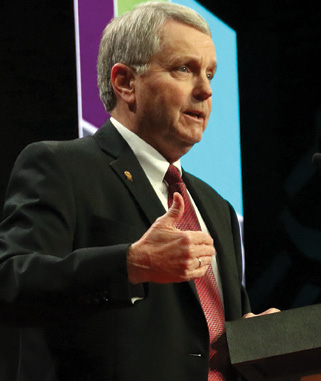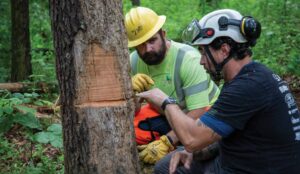Twelve volunteer linemen, supported by 19 Illinois electric cooperatives and a matching grant from the National Rural Utilities Cooperative Finance Corporation (CFC) International Projects grant program, traveled to Bolivia on March 13. The three-week project included tackling the electrification of 62 homes, an orphanage, school and a community center in remote mountain villages, as part of NRECA International efforts.
The linemen represented Corn Belt Energy Corporation, Bloomington; Eastern Illini Electric Cooperative, Paxton; Illinois Electric Cooperative, Winchester; Jo-Carroll Energy, Inc., Elizabeth; McDonough Power Cooperative, Macomb; Menard Electric Cooperative, Petersburg; Norris Electric Cooperative, Newton; Tri-County Electric Cooperative, Inc., Mt. Vernon; and the Association of Illinois Electric Cooperatives (AIEC), Springfield.
Materials, equipment and additional labor was provided by local Cooperativa Rural De Electrificación (CRE), the largest electric cooperative in the world, serving more than 500,000 members. In 1963, NRECA International helped establish CRE after it, and the newly-established U.S. Agency for International Development (USAID), signed an inaugural cooperative agreement in the White House Oval Office in a ceremony witnessed by President John F. Kennedy.
“Bolivia has pursued an active rural electrification policy since NRECA International first began working in the country in the early 1960s,” said Duane Noland, AIEC president and CEO. “To date, CRE has hooked up about 70 percent of the department (state) of Santa Cruz, which is about the size of Montana.”
At a planning meeting before the group left the U.S., Norris Electric Journeyman Lineman Bill Fields said he was excited. “It’s an opportunity you can’t pass up. You come home much more grateful and appreciative of what you have,” he explained. “And, our members like that we are helping out and giving back.”
For Brett Richards, Corn Belt Energy Construction Foreman, the ability to improve the lives of the people was his motivation. Richards remarked, “The women are afraid to walk from village to village in the dark because it isn’t safe. And, we’ll be working on electrifying an orphanage that currently has no way to refrigerate vaccinations for the children. It would really help to reduce the spread of disease.”
Matt Eisenmenger, Safety Instructor for the Association of Illinois Electric Cooperatives, and Ryan Stadel from Jo-Carroll Energy, Inc., traveled to Bolivia last year to evaluate the scope of the work. Eisenmenger could also see learning opportunities for the linemen as they work together and observe how their fellow linemen do their work and handle inspections. He pointed out that when helping other states with large outages, linemen often discover new ways of handling tasks and he expects to learn from them and from those in Bolivia.
The project has many components and Eisenmenger said, “It’s a huge undertaking in some very difficult terrain. We have an orphanage, a school, a community center and a tourist spot with Inca ruins. I just hope we can get it all done.”
“This is not the first time a group from Illinois has supported international electrification efforts,” said Noland. “Two years ago, a trio of linemen from Corn Belt Energy Corporation in Bloomington and McDonough Power Cooperative in Macomb spent three weeks in Haiti constructing and upgrading power lines. In 2014, AIEC’s Jim Miles, along with two linemen from Southern Illinois Electric Cooperative in Dongola, traveled to Guatemala to train line crews on safe operating practices. However, this is the first time we’ve sent this many linemen to one location at the same time, and it will hopefully be just the first of many trips internationally.”
Noland and NRECA Board President and Tri-County Electric Cooperative, Inc. Director Phil Carson were scheduled to be in Bolivia for the lighting ceremony on March 30.
NRECA International is a non-profit corporation committed to improving the quality of life for rural communities in developing economies by providing access to reliable and affordable electricity. For more than 50 years, 120 million people in 43 countries have benefitted from its work and many lives in rural communities have improved in the form of agricultural productivity, improved healthcare, new jobs in micro and small enterprises, and higher incomes and quality of life.









